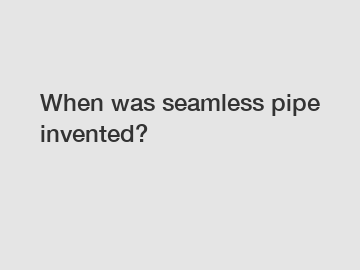When was seamless pipe invented?
When Was Seamless Pipe Invented?
Seamless pipes are widely used in various industries for the transportation of fluids and gases. They are considered essential components in the oil and gas, petrochemical, and construction industries, among others. But have you ever wondered when seamless pipes were actually invented? In this article, we will delve into the history of seamless pipe manufacturing, exploring its origins, advancements, and the impact it has had on modern industries.
Origins of Seamless Pipe Manufacturing.

The concept of seamless pipes can be traced back to ancient times. The ancient Persians, Egyptians, and Chinese were among the first civilizations to utilize hollowed logs and reeds to transport water. However, these methods were limited by the materials available and the difficulties in their manufacturing processes.
During the industrial revolution, the demand for more efficient transportation systems grew exponentially. It was then that the first continuous pipe manufacturing method was developed. This method involved heating a solid steel billet and piercing it with a mandrel to create a hollow tube shape. The process was labor-intensive and time-consuming but marked a significant milestone in the history of seamless pipes.
Advancements in Seamless Pipe Manufacturing.
In the late 19th century, the invention of the Mannesmann process revolutionized the manufacturing of seamless pipes. German engineers Reinhard and Max Mannesmann developed a method of producing seamless tubes by using a cross-roll piercing mill. This innovation allowed for faster and more cost-effective production of seamless pipes.
Impact on Modern Industries.
The invention and continuous improvement of seamless pipe manufacturing processes have had a profound impact on various industries. In the oil and gas sector, seamless pipes are widely used for transporting crude oil and natural gas over long distances. Their ability to withstand high pressures and temperatures makes them ideal for offshore drilling and deep-water exploration.
In the petrochemical industry, seamless pipes are crucial for the transportation of various chemicals and gases, ensuring the safety and efficiency of production processes. They are also extensively used in power plants for the circulation of steam and coolant fluids.
In the construction industry, seamless pipes play a vital role in the structural integrity of buildings and infrastructure projects. They are used for plumbing systems, heating and cooling systems, and as underground conduits for electrical cables.
As seamless pipe manufacturing techniques continue to evolve, the applications and industries that rely on them will undoubtedly expand. The ability to produce seamless pipes with higher strength and corrosion resistance will enable the development of more efficient and sustainable infrastructures.
Conclusion.
Seamless pipes have a long and rich history that dates back centuries. From their humble origins in ancient civilizations to the modern manufacturing processes, seamless pipes have revolutionized various industries. The continuous advancements in the manufacturing techniques have resulted in stronger, more reliable seamless pipes that meet the ever-increasing demands of today's industrial sectors.
If you have any further questions about seamless pipes or their applications in your industry, feel free to contact us. Our team of experts will be more than happy to assist you and provide you with the information you need.
Want more information on pipe reducers, pipe reducer size, china steel pipe factory? Feel free to contact us.
121
0
0


Comments
All Comments (0)